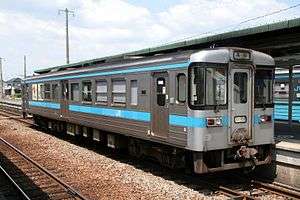JR Shikoku 1000 series
| 1000 series | |
|---|---|
|
Car number 1001, July 2008 | |
| In service | 1990–Present |
| Manufacturer | Niigata Transys |
| Constructed | 1990–1997 |
| Number built | 56 vehicles |
| Number in service | 38 vehicles |
| Formation | Single car |
| Capacity | 151 (70 seated) |
| Operator(s) | JR Shikoku |
| Depot(s) | Kōchi, Tokushima |
| Line(s) served | Kōtoku Line, Tokushima Line, Mugi Line, Dosan Line |
| Specifications | |
| Car body construction | Stainless steel |
| Car length | 20,800 mm (68 ft 3 in) |
| Width | 2,800 mm (9 ft 2 in) |
| Height | 3,825 mm (12 ft 6.6 in) |
| Doors | Three per side |
| Maximum speed | 110 km/h (70 mph) |
| Weight | 31.5 t |
| Prime mover(s) | SA6D125-H (x1) |
| Power output | 400 hp (at 2,100 rpm) |
| Bogies | S-DT57/S-TR57 |
| Track gauge | 1,067 mm (3 ft 6 in) |
The 1000 series (1000形) is a single-car diesel multiple unit (DMU) train type operated on local regional services by Shikoku Railway Company (JR Shikoku) in Japan since 1990.[1]
Operations
The 1000 series trains are used on the following JR Shikoku lines.[2]
Build details and variants
A total of 56 1000 series cars were built by Niigata Transys between 1990 and 1997, delivered in four batches as shown below.[3]
| Batch | Vehicle numbers | Build date |
|---|---|---|
| 1 | 1001-1028 | 1990 |
| 2 | 1029-1048 | 1992 |
| 3 | 1049-1050 | 1995 |
| 4 | 1051-1056 | 1997 |
Interior
Passenger accommodation consists of a mixture of longitudinal bench seating on one side and transverse seating bays on the opposite side.[3] Toilets have been retro-fitted to a number of cars since February 2001.[3]
 Interior view, July 2007
Interior view, July 2007
History
In 2008, 18 1000 series cars were modified to make them compatible with newly delivered 1500 series DMU cars, and were reclassified as 1200 series.[3]
References
- ↑ JR全車輌ハンドブック2009 [JR Rolling Stock Handbook 2009]. Japan: Neko Publishing. 2009. p. 487. ISBN 978-4-7770-0836-0.
- ↑ Haraguchi, Takayuki (2009). Encyclopedia of JR's Railway Cars: JR全車輌. Japan: Sekai Bunka. p. 140. ISBN 978-4-418-09905-4.
- 1 2 3 4 Nishiwaki, Kōji (September 2010). "JR各社の新世代気動車の現況 JR四国1000形" [The Current Situation of JR Group Modern DMUs: JR Shikoku 1000 series]. Japan Railfan Magazine. Vol. 50 no. 593. Japan: Kōyūsha. pp. 97–101.
External links
| Wikimedia Commons has media related to 1000 series. |
- 1000 series details on JR Shikoku website (in Japanese)
This article is issued from
Wikipedia.
The text is licensed under Creative Commons - Attribution - Sharealike.
Additional terms may apply for the media files.

